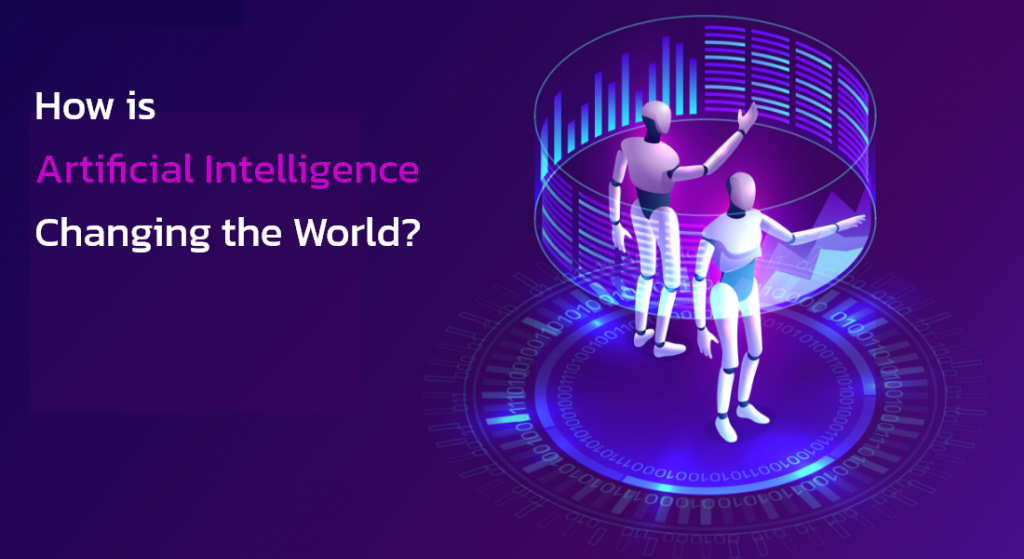From its origins on the margins of a company’s innovation labs to the present day, when people are beginning to understand that it can revolutionize organizations from the inside out, AI’s function has evolved tremendously. The Future of AI is bright and according to reports, AI will be able to translate languages better than humans by 2024, promote things better than humans by 2031, and conduct surgical procedures better than humans by 2053.

Now let’s take a look at how Artificial Intelligence future trends will change the world:
Machine Learning is an artificial intelligence app that allows computers to assess and improve from experience without explicitly coding automatically. It specializes in developing computer programs that can access and analyze data independently. It refers to computer software learning and working on new information without involving humans.
ML keeps a computer’s internal algorithms current and allows it to select data and make predictions based on it. You can utilize ML in various industries, including financing, report delivery, fraud detection, etc. So you can say that Machine learning is said to be the future of AI
Virtual classrooms are the future of education. Many courses are currently available on platforms that are both informative and accessible from anywhere. Instructors and educational institutions can delegate administrative responsibilities using AI.
Educators spend a lot of time grading examinations, going through assignments, and presenting important information to their students. The automation of categories and the processing of paperwork is possible thanks to artificial intelligence. From the comfort of one’s own home, education may be redefined to meet each learner’s particular needs.
Firms are using AI to increase team productivity. It benefits automated repetitive operations across the organization, letting workers focus on creative ideas, complex trouble solving, and high-impact work. As a result of technical progress, the workplace paradigm may also change. Work in the future may be very adaptive. Working from home has become the new normal, with virtual conferences and seminars becoming more common. This may result in a drop in demand for industrial real estate.
The apps of AI in defense and security are virtually limitless. AI is commonly integrated into weaponry and management systems to enhance performance. It regularly improves target recognition, flying simulation and training, and risk monitoring.
Most crucially, the vital and dangerous work of securing the country’s borders might be entrusted to artificially intelligent robots, uncrewed aircraft, drones, and uncrewed aerial vehicles (UAVs). This might reduce the risk of soldiers dying on the border and provide greater monitoring through the deployment of powerful facial recognition technology.
The metaverse is a vision of a connected 3D digital environment in which real and virtual worlds are combined via technologies such as VR and AR. There are already several metaverses, such as those found in digital game platforms such as The Sandbox and virtual worlds such as Decentraland. AI can process enormous amounts of data at breakneck speed to provide insights and prompt action. Users can use AI for decision-making (as in most agency applications) or combine AI and automation for low-contact operations.
These 2 topics in tech are frequently discussed together. Car manufacturers are using artificial intelligence all over the world. Machine learning and artificial intelligence are being used to improve the way cars are manufactured and operate on the road. Each segment has an electric vehicle, including scooters, motorcycles (Revolt), hatchbacks (Mahindra e2O), small sedans (Tata Tigor), compact SUVs (Tata Nexon), SUVs (MG ZS EV), and several high-end top-class services from Mercedes-Benz, Jaguar, Audi, and BMW.
AI is now utilizing various fast-paced technologies in traffic management, including ITMS, ATCS, LMT, Law Enforcement, and many more. The strength of AI, which drives many of these systems’ information analyses, is also what drives ride-hailing and last-mile delivery companies’ navigation systems. Deliveries or order fulfillments that were previously late can now be significantly improved as municipalities continue to adopt such astute visitor infrastructure.
Robots are the future mechanism of AI. Robotic delivery has finally taken off in 2022. Drones will be utilized for medical purposes in cities, transporting samples and chemicals from hospitals to laboratories faster than automobiles can go. Detecting and detonating bombs, working in hostile areas, and creating things or additives regularly are all examples of repetitive tasks.
You can conclude that Future of AI is everything and soon, you will do everything with the help of AI. This era is coming soon, and you need to upgrade your talents to keep ahead of the curve, stay in the market, and make progress. Get more information by following DevTechToday for more of these posts